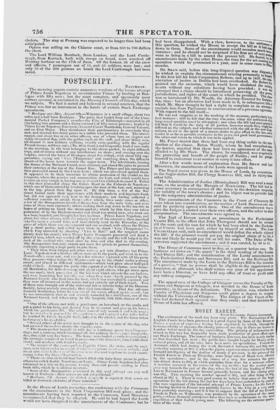In the House of Lords yesterday, the conference with the
Commons on the amendments in the Irish Corporation Bill took place ; and the amendments having been reported to the Commons, Lord Monrorit recommended that they be adopted. Ile said he had hoped the Lords Would not have disagreed to the amendntents of the Commons ; but he
had been disappointed. With a view, however, to the settle" this question, he wished the House to accept the bill as h Wes; down to them. Some of the amendments would occasion muck ill venienee ; and he should not be surprised if his first act of next sea;;;; were to bring in a bill to amend the present bill. He feared, by fix amendments made by the other House, the time for the act coming's% operation would be protracted to a year, and in some eases to fin% months.
Mr. SHAW said, before this long-litigated question was disposek he wished to explain the circumstances relating personally to hiniet In the first bill for Irish Corporation Reform, and up to 1837, the ad„, nistration of justice in Dublin had been overlooked. Sir Robert pfei pointed out the omission, svhich would have abolished the existist courts without any substitute having been provided o it was estl arranged that a clause should be introduced preserving all the posh jurisdictions, and rights of the court in which he presided. The class r was so introduced by Mr. Woulfe, the Attorney-General for Irelands the:: time : but nn alteration had been made in it, in subsequent bilks 1: which Mt. Shaw thought he had a right to complain as an attempts exclude him from Parliament in contravention of a previous agreenies With regard to the bill itself- lle was ont sanguine as to the working of the measure particularly itith first instance : still lie felt that the time was come when the settlement ofill lono.-vexed question must be attempted ; and when the bill bad once passsue felt it would be the duty of all parties, however much they nught differed on the subject, mid whether connected with the old or the new Coes rations, to net in the spirit of a sincere desire to give effect to the law, sato render it as far as possible conducive to the peace and good local government0 the cities and towns to It hick it was to be applied.
Mr. PlGOT denied that there had been any thing unfair in the its duction of the clause. Baron Woulfe, whom he had consultedatee the matter, asserted that there had been no agreement of the name 'T alluded to by Mr. Shaw. The clause, he considered, was requiredfor the protection and benefit of the people of Dublin ; and he pledged himself to endeavour next session to carry it into effect.
After a few words more of explanation from Mr. SHAW and Lord Moues:Tit, the amendments of the Lords were agreed to.
The Royal assent was given in the House of Lords, by commission to the Sugar-duties Bill, the Clergy Reserves Bill, and to thirty-bre other bills.
The Administration of Justice (Birmingham) Bill was read a semi time, on the motion of the Marquis of NORMANEY. The bill had to 1 conic necessary in consequence of the delay in the decision respecting time validity of the town's charter ; and its object was to provide lush for the temporary administration of justice.
The amendments of the Commons in the Court of Chancery Id were taken into consideration, on the motion of Lord BROMIAMI silo said he perfectly agreed with them. One of the amendments was give the Judges a control over their own officers, and the other to albs compensation. The amendments were agreed to.
The Earl of DEVON moved an amendment in the Ecclesiastical Courts Bill, to the effect that John Thorogood should not be released
till the costs end the sum for which he had been cited in the Ecelesin.
tical Courts had been paid, either by himself or others. The LORD CHANCELLOR said, such an amendment would defeat the whole objectof the bill : if the prisoner would not pay the original claim of 5s, td.,ft was not iihueiy he would pay 70/. or 80/. for costs. The Duke of WV: LINGTON supported the amendment ; and it was carried, by 28 to 15.
The House of Commons meet to-day, at a quarter before one. The business set down on " the paper" is the third reading of the London Coal-Duties Bill ; and the consideration of the Lords' amendments to the Ecclesiastical Ditties and Revenues Bill, and to the Railways The amendment made by the Lords in the Railways Bill is the bisection of a proviso, "that no person shall be eligible to the appointment as Inspector, as aforesaid, who shall within one year of his appointment have been a Director, or have held any office of trust or profit under any railway company."


























 Previous page
Previous page